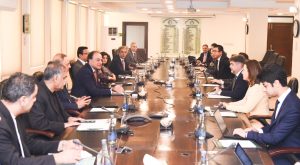Pakistan’s new government seems determined to address the country’s financial woes by privatizing dozens of loss-making state-owned enterprises. Stressing that there is “no such thing” as strategic state-owned enterprises, Finance Minister Muhammad Aurangzeb said that the government is committed to the privatization and reform agenda.
Addressing a media conference in Lahore, the finance minister emphasized that there is “no going back” on the privatization plans, as the country’s “hands have been forced.”
Deputy Prime Minister Ishaq Dar echoed similar sentiments, stating that the government will limit its business to only strategic and essential state-owned enterprises.
The urgency behind this move is obvious. The Shehbaz Sharif government, supported by Pakistan’s powerful military, is seeking to reduce the financial burden caused by the continued losses of state-owned enterprises. These losses are exacerbated by issues such as massive power thefts, a bloated workforce of politically appointed employees, and tax collection problems stemming from the Federal Board of Revenue’s reluctance to implement reforms.
Additionally, sectors like real estate have long operated without an active taxation regime while power, petroleum, and food-related relief arrangements have further strained the government’s resources. With high inflation and businesses operating at reduced capacity, the public is only interested in seeking relief, subsidies, and concessions. They are not prepared for new taxation measures. This might make the finance minister’s job of putting Pakistan on a trajectory of export-led growth even more challenging.
The new government faces political landmines as it navigates the complex task of restructuring the state-owned enterprises and implementing reforms. Reports suggest that efforts to bring more retailers and traders into the tax net could potentially alienate the core base of the ruling Pakistan Muslim League-Nawaz (PML-N), which suffered a massive setback in its stronghold of Punjab in recent elections.
The ongoing wheat crisis has also angered the rural middle-income communities in Punjab, as the government lacks the resources to purchase wheat, having recently imported a significant amount.
The upcoming budget, likely to be in line with International Monetary Fund (IMF) demands, may lack relief measures for the public, further upsetting the masses across the country.
However, the silver lining is that Pakistan recognizes the urgent need for reforms, and the international community is taking note of the country’s determination to introduce major changes.
Wall Street bank Citi has projected that Pakistan will likely reach an agreement with the IMF for a new four-year $8 billion program by the end of July, which could positively impact the country’s 2027 international bonds. Moreover, the Pakistan Stock Exchange has witnessed a surge in activity in recent weeks, with the index crossing the significant threshold of 74,000 points, indicating investor confidence and optimism about the economic outlook.
Additionally, there are expectations of a major rollover from China, while Saudi Arabia and other Gulf states are expected to make significant investments in the privatization of loss-making enterprises and other projects. This bodes well for Pakistan, as it could pave the way for other investors, as the stakes for stability in the country grow.
These measures are backed by the Special Investment Facilitation Council (SIFC), a civil-military-led body that is approving all strategic-level reforms, cutting red tape, and pushing for support for the reform agenda. This at least shows that both the civil and military leaderships are in sync with the need to move forward with the reform agenda.
The urgency to address the country’s financial woes is clear, and the government seems determined to take bold steps to turn the tide. The bigger and perhaps key challenge for the government in the short run could be how people, businesses, and political and other domestic vested interests react to these reforms.
If the government can navigate that, it could turn the page on Pakistan’s economy.

































